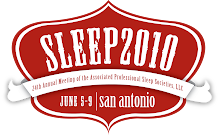Two studies being presented today address the relationships between sleep, diet and exercise.
A study (#1277) being presented later this morning as a poster reports the surprising finding that regular daily exercise did not correlate with total sleep time. Instead, the study found that sleep improved after days of low exertion, and better-rested participants got less exercise and had less calorie expenditure. Possible explanations for these unexpected findings include differences in personality types and the influence of job and life stress.
A study (#0385) being presented this afternoon as an oral presentation found that sleep-restricted participants gained weight over the 11 days of the study even though they reported a decrease in appetite, food cravings and food consumption. The results suggest that energy intake still exceeded energy expenditure during sleep restriction in the sedentary environment of the laboratory.
You can download the SLEEP 2009 abstract supplement as an 11 MB file in PDF format.
Showing posts with label exercise. Show all posts
Showing posts with label exercise. Show all posts
Monday, June 8, 2009
Wednesday, June 11, 2008
Internet, Aerobic Exercise May Help People with Insomnia
Two studies being presented as poster presentations this morning at SLEEP 2008 offer hope to those who suffer from insomnia.
A study (ID# 0716) of 44 participants shows that a self-help program delivered via the Internet can significantly improve insomnia in adults. Individuals in the study group had an average age of 45 years, and 77 percent were women.
Participants reported having an average of five nights per week of sleep difficulties for about 10 years. The study involved a six-week, structured, interactive, self-guided, and tailored intervention that took traditional face-to-face cognitive behavioral therapy and transformed it for delivery via the Internet.
Results show that sleep improved significantly over the six-week period. Sleep efficiency (i.e., the percentage of time in bed spent sleeping) improved from 66 percent to 88 percent. The average nightly total sleep time of the participants increased by 80 minutes.
Another study (ID# 0737) of 36 adults with chronic primary insomnia suggests that moderate aerobic exercise can help people with insomnia get some sleep.
The study involved 28 women and 8 men with an average age of 44 years. Results show that a 50-minute session of moderate aerobic exercise on a treadmill improved numerous measures of sleep quality. It decreased sleep onset latency (i.e., the amount of time it takes to fall asleep) by 54 percent and decreased wake time in bed by 36 percent after the exercise session.
The session of moderate aerobic exercise, which began at 6 p.m., also increased total sleep time by 21 percent and increased sleep efficiency by 18 percent.
Similar results were not achieved with either heavy aerobic exercise or moderate strength exercise. Heavy aerobic exercise involved three periods of 10 minutes of exercise on a treadmill alternating with 10 minutes of rest. Strength exercise lasted about 50 minutes and involved: shoulder press, chest press, vertical traction, leg press, leg curl, leg extension, abdominal crunch and lower back.
The SLEEP 2008 abstract book is available online at http://www.journalsleep.org/PDF/AbstractBook2008.pdf.
A study (ID# 0716) of 44 participants shows that a self-help program delivered via the Internet can significantly improve insomnia in adults. Individuals in the study group had an average age of 45 years, and 77 percent were women.
Participants reported having an average of five nights per week of sleep difficulties for about 10 years. The study involved a six-week, structured, interactive, self-guided, and tailored intervention that took traditional face-to-face cognitive behavioral therapy and transformed it for delivery via the Internet.
Results show that sleep improved significantly over the six-week period. Sleep efficiency (i.e., the percentage of time in bed spent sleeping) improved from 66 percent to 88 percent. The average nightly total sleep time of the participants increased by 80 minutes.
Another study (ID# 0737) of 36 adults with chronic primary insomnia suggests that moderate aerobic exercise can help people with insomnia get some sleep.
The study involved 28 women and 8 men with an average age of 44 years. Results show that a 50-minute session of moderate aerobic exercise on a treadmill improved numerous measures of sleep quality. It decreased sleep onset latency (i.e., the amount of time it takes to fall asleep) by 54 percent and decreased wake time in bed by 36 percent after the exercise session.
The session of moderate aerobic exercise, which began at 6 p.m., also increased total sleep time by 21 percent and increased sleep efficiency by 18 percent.
Similar results were not achieved with either heavy aerobic exercise or moderate strength exercise. Heavy aerobic exercise involved three periods of 10 minutes of exercise on a treadmill alternating with 10 minutes of rest. Strength exercise lasted about 50 minutes and involved: shoulder press, chest press, vertical traction, leg press, leg curl, leg extension, abdominal crunch and lower back.
The SLEEP 2008 abstract book is available online at http://www.journalsleep.org/PDF/AbstractBook2008.pdf.
Subscribe to:
Posts (Atom)



